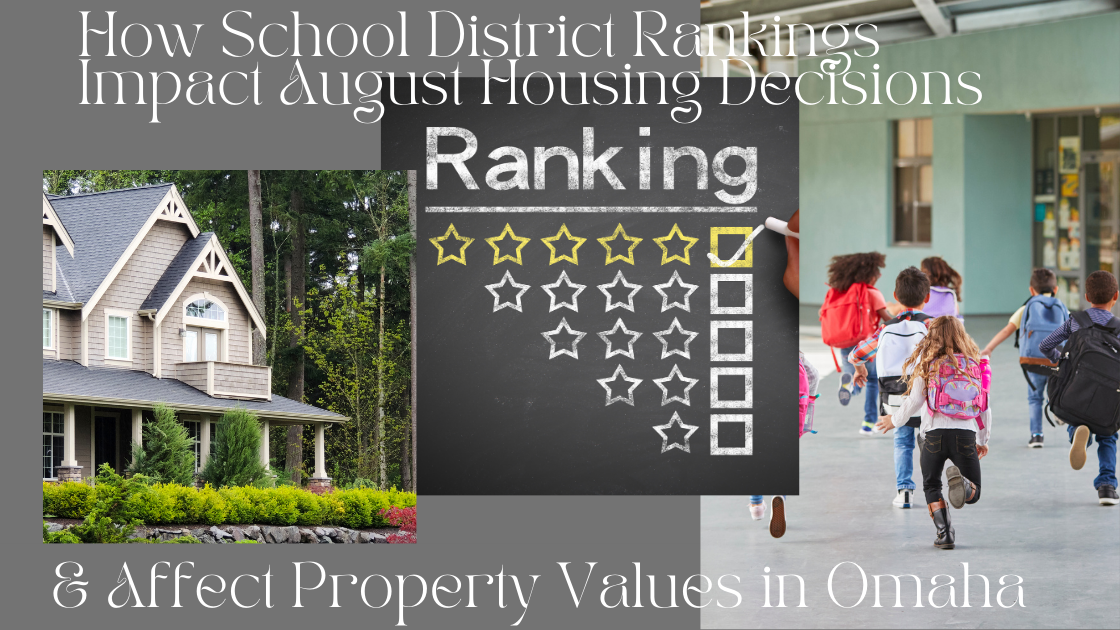As some of our Omaha Metro clients prepare for the new school year, we were discussing the familiar journey they’re facing. Suppose your eldest is ready to start high school. What if you find yourself caught in the melee of a 'back-to-school mash-up with house hunting? Depending on where you look, this could create a significant challenge as you try to balance academic opportunities with your family budget.
This quest highlights the broader implications of how school district quality directly impacts real estate investment across our whole region. Whether you're buying your first home or considering a strategic move, understanding the connection between school ratings and property values can save you thousands or help you make thousands more.
In our experience, you’d be surprised at how much district performance drives home values. One thing is certain: the numbers don’t lie. The Omaha metropolitan area showcases a clear hierarchy in school district performance, and the housing market reflects this reality. Millard North High School ranks #5 as the top high school in Nebraska according to US News and World Report, while Millard West High School ranks in the top 30% of all Nebraska schools for overall test scores.
However, upon further investigation, we found that Omaha Public Schools ranked 177th out of 182 districts in Nebraska. These results create significant disparities in home values across district boundaries.
If you're considering a move, Millard North's top ranking suggests it's worth scheduling a viewing in the district neighborhoods to explore properties, ensuring you're ready to act quickly. The bottom line is that homes in the Millard West district could change your budget plans, due to rising test scores. Conversely, Omaha Public Schools' ranking may indicate potential for renegotiations in property pricing, offering room for strategic investment decisions.
Current District Rankings Overview:
- Millard Public Schools: Top-tier district with multiple schools ranking in the state's top 10%
- Westside Community Schools: Ranked #108 out of 246 school districts in Nebraska (top 50%)
- Bennington Public Schools: Rapidly growing district with strong community support
- Omaha Public Schools: Largest district serving 51,693 students, facing performance challenges
Savvy buyers and sellers recognize that August is a pivotal month for housing decisions, offering unique advantages. As families experience their children's school environments firsthand during the opening weeks, motivation to relocate often peaks in late August and early September.
Why August Matters:
- Parents gain real-time insights into their current school's quality
- New academic year brings fresh awareness of educational options
- Less competition than the traditional spring buying season
- Teachers and school staff often relocate during summer breaks
- District boundary changes typically take effect with the new school year
District Boundary Changes: The Hidden Value Shifts
School district boundaries in the Omaha area continue evolving as suburban growth pushes development westward. These seemingly administrative changes can have a dramatic impact on property values overnight.
Recent Boundary Impact Areas:
- West Omaha Growth Corridor: New developments often choose incorporation into higher-rated districts
- Millard District Expansion: Continued westward growth increases home values in newly included areas
- Papillion-La Vista Overlap: Boundary adjustments affect home values along district edges
- Douglas County Rural Transitions: Agricultural areas converting to residential often see district realignments
Let’s look at a real impact example. For example, a home located within Millard Public Schools' boundaries typically commands a 15-25% premium over a comparable home in Omaha Public Schools, translating to $40,000-$70,000 in additional value on a median-priced home.
Long-Term Value Projections by School Zone
Understanding district trajectories helps predict future property appreciation. Here's what demographic and performance data suggest for major Omaha school districts:
Millard Public Schools - Strong Appreciation Outlook
- Current Status: Consistently top-rated district with Niche.com A rating
- Growth Pattern: Steady westward expansion with new housing developments
- Value Projection: An annual appreciation of 6-8% above the metro average is expected, driven by the area's steady influx of families seeking top-rated educational opportunities and policy initiatives that promote residential growth. This projection is supported by demographic trends indicating a 10% increase in school-aged children over the next five years, as reported by the Omaha Education Planning Group.
- Investment Sweet Spot: Homes near district boundaries are likely to benefit from expansion
Westside Community Schools - Moderate Growth
- Current Status: Solid middle-tier performance with a stable community
- Growth Pattern: Limited expansion but consistent quality maintenance
- Value Projection: 3-5% annual appreciation above metro average
- Investment Consideration: Established neighborhoods with renovation potential
Papillion-La Vista - High Growth Potential
- Current Status: Rapidly improving district with new facilities
- Growth Pattern: Aggressive expansion southward from Omaha
- Value Projection: 7-10% annual appreciation in select areas
- Investment Opportunity: New construction areas showing the strongest gains
Omaha Public Schools - Selective Opportunities
- Current Status: Mixed performance but significant redevelopment investment
- Growth Pattern: Urban renewal and targeted improvement initiatives
- Value Projection: Varies widely by specific school attendance zones
- Investment Strategy: Focus on magnet school areas and redevelopment corridors
Practical Steps for August Home Buyers
Research Beyond Rankings
- Visit schools during active hours to observe the environment
- Review test scores, but also consider extracurricular offerings
- Investigate future district development plans
- Analyze teacher retention rates and experience levels
Boundary Awareness
- Verify exact district boundaries—they change more frequently than expected
- Consider proximity to boundary lines for future flexibility
- Investigate upcoming redistricting plans
- Confirm elementary, middle, and high school assignments
Financial Considerations
- Calculate property tax differences between districts
- Factor in private school alternatives if needed
- Consider resale value implications for future moves
- Evaluate transportation costs and time commitments
The Bottom Line for Omaha Real Estate
School district quality remains the single strongest predictor of residential property value stability and growth in the Omaha metropolitan area. With 84% of Omaha's K-12 students educated in public schools, district performance has a direct impact on the housing decisions of the majority of families.
Choose wisely, and your home investment will appreciate, just as your children's education does. As summer changes to fall, remember that your housing decision affects not only your family's daily life but also your long-term financial position. Smart August buyers should focus on homes within top-rated districts or properties positioned to benefit from future boundary adjustments. For sellers, highlighting the advantages of a particular school district and providing concrete performance data can justify premium pricing and accelerate sales.
As longtime Omaha residents and seasoned real estate professionals, the Heim-Berg Team has guided countless families through the complex intersection of school districts and home values. Our deep-rooted knowledge of the metro area's educational landscape, combined with decades of real estate experience, enables us to understand not only where the best schools are today, but also where tomorrow's opportunities will emerge.
We've watched neighborhoods transform as district boundaries evolved, witnessed the impact of new school construction on property values, and helped families make strategic moves that benefited both their children's education and their financial future. When you work with the Heim-Berg Team, you're partnering with professionals who truly understand how Omaha's school districts shape our real estate market.
Don't navigate the complex relationship between school districts and property values alone. Whether you're searching for your family's perfect educational fit or timing a strategic sale to maximize your investment, the Heim-Berg Team has the local expertise and market knowledge to guide you to success.
Your Omaha Real Estate Experts: 📞 Call: (402) 677 - 9024
🌐 Visit: https://www.omohaarealiving.com
Let our experience work for your family's future. Contact the Heim-Berg Team today—because the right home in the right district changes everything.





 When buying a home in Omaha and getting a mortgage, you will hear the term "escrow" mentioned frequently. An escrow is a legal arrangement where a third party holds money or property until a specified condition is fulfilled, such as completing the home purchase as outlined in the agreement.
When buying a home in Omaha and getting a mortgage, you will hear the term "escrow" mentioned frequently. An escrow is a legal arrangement where a third party holds money or property until a specified condition is fulfilled, such as completing the home purchase as outlined in the agreement.

.jpg) Are you ready to buy your first home in Omaha?
Are you ready to buy your first home in Omaha?








